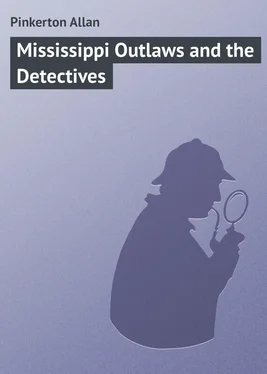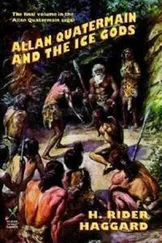Allan Pinkerton - Mississippi Outlaws and the Detectives
Здесь есть возможность читать онлайн «Allan Pinkerton - Mississippi Outlaws and the Detectives» — ознакомительный отрывок электронной книги совершенно бесплатно, а после прочтения отрывка купить полную версию. В некоторых случаях можно слушать аудио, скачать через торрент в формате fb2 и присутствует краткое содержание. Жанр: Классический детектив, foreign_detective, foreign_prose, foreign_language, на английском языке. Описание произведения, (предисловие) а так же отзывы посетителей доступны на портале библиотеки ЛибКат.
- Название:Mississippi Outlaws and the Detectives
- Автор:
- Жанр:
- Год:неизвестен
- ISBN:нет данных
- Рейтинг книги:3 / 5. Голосов: 1
-
Избранное:Добавить в избранное
- Отзывы:
-
Ваша оценка:
- 60
- 1
- 2
- 3
- 4
- 5
Mississippi Outlaws and the Detectives: краткое содержание, описание и аннотация
Предлагаем к чтению аннотацию, описание, краткое содержание или предисловие (зависит от того, что написал сам автор книги «Mississippi Outlaws and the Detectives»). Если вы не нашли необходимую информацию о книге — напишите в комментариях, мы постараемся отыскать её.
Mississippi Outlaws and the Detectives — читать онлайн ознакомительный отрывок
Ниже представлен текст книги, разбитый по страницам. Система сохранения места последней прочитанной страницы, позволяет с удобством читать онлайн бесплатно книгу «Mississippi Outlaws and the Detectives», без необходимости каждый раз заново искать на чём Вы остановились. Поставьте закладку, и сможете в любой момент перейти на страницу, на которой закончили чтение.
Интервал:
Закладка:
Throughout this whole district, the people suffer from fever and ague for nine months of the year, and dyspepsia seems hereditary. Their physicians, however, usually require no further education than is requisite to attend fractured limbs and gun-shot wounds, the whole school of medicine being limited to three specifics: quinine, calomel, and whisky.
As before stated, it should be understood that the foregoing description applies to the majority of the inhabitants of the low swamp lands only, and not to the residents in and about the towns; even in the cane country itself are to be found occasionally men of education, ability, and good character, and to several of them William was largely indebted for assistance and information.
There was one redeeming feature also to the character of the "cane-fed" population; in the main they were honest, and they would do all in their power to break up a thieving gang, even if they had to hang a few of its members as a warning to the rest. I was thus able to trust them to a certain extent, though the fear which they had of this band of desperadoes rather kept their naturally honest impulses in check for a time.
William was thoroughly acquainted with the character of the people, and he knew what a difficult task had been set before him, especially as he was allowed no other detectives of my force to assist him, the express company being desirous of conducting the operation as economically as possible. Among the large number of men employed directly by the company were two or three good men, but the majority were even worse than useless, and the expense of the affair was finally much greater than as if only my own men had been employed. Besides the fact that William was thus continually working with strange men, he was harassed by large numbers of amateur detectives, to whose stories the company's officers too often lent a ready ear. Indeed, every express agent in Tennessee, Kentucky, and Missouri seemed impressed with the idea that he was a naturally gifted detective, and many were the annoying delays which resulted from their interference.
CHAPTER II
Difficulties. – Blind Trails and False Scents. – A Series of Illustrations showing the Number of Officious People and Confidence Men that often seek Notoriety and Profit through important Detective Operations.
The art of detecting crime cannot be learned in a day, nor can the man of business understand, without previous experience in the habits of criminals, the expedients which the boldest class of law-breakers adopt; hence none but skilled detectives can hope to cope with them. Yet often my clients insist on some certain method of procedure wholly contrary to my judgment and experience, until the total failure of their plan convinces them that there can be but one thoroughly successful mode of detection, namely, to submit the case to a skilled detective of character and standing, and allow him to act according to his judgment.
The range of investigation in such a case as this robbery will often extend from New York to San Francisco, and unless one mind gathers up the clues, classifies the information, and determines the general plan, there will be continual error and delay. Such a state of affairs frequently occurred during this operation, and much time and money were spent upon matters too trifling even for consideration.
The principal of a detective agency, from his long experience with criminals, learns the earmarks of different classes of men, and he is often able to determine the name of the guilty party in any given robbery by the manner in which the job was done. He can readily see whether a novice in crime was engaged, and also whether any collusion existed between the parties robbed and the criminals; and so, when he sees the traces of a bold, skillful, and experienced man, he knows that it is useless to track down some insignificant sneak-thief, simply because the latter happens to have been in the vicinity. Yet, neither will he slight the smallest clue if there is a bare chance that any valuable fact may be obtained from it. But the sine qua non is that he, and he alone, shall direct the whole affair. A divided responsibility simply doubles the criminal's opportunities for escape.
Among the many difficulties of the detective's work, none are more embarrassing than the early development of false clues. In the stories heretofore published, the direct steps leading to the detection and arrest of the criminals have been related, without referring to the innumerable other investigations, which were progressing simultaneously, and which, though involving the expenditure of much thought, time, and money, proved after all to be of no value whatever in developing any evidence in the case. In this operation, such instances were of frequent occurrence, and I propose to mention a few of them to show how wide is the range of the detective's inquiries, and also the annoying delays to which he is often subjected by the inconsiderate zeal and interference of outside parties. These latter may be – indeed, they generally are – well meaning people, anxious to serve the cause of justice; though, on the other hand, they are sometimes spiteful meddlers, striving to fix suspicion upon some personal enemy.
The plan of detection which alone can insure success, must be one which neither forgets nor neglects anything. In investigating any alleged crime, the first questions to be considered are: 1. Has any crime been perpetrated, and, if so, what? 2. What was the object sought thereby?
The matter of time, place, and means employed must then be carefully noted, and finally we come to consider: 1. Who are the criminals? 2. Where are they now? 3. How can they be taken?
The fact that a crime has been committed is generally apparent, though there have been cases in which the determination of that point requires as much skill as the whole remainder of the operation. Such was the case in the detection of Mrs. Pattmore's murder, related in my story of "The Murderer and the Fortune Teller." The object of a crime is also sometimes obscure, and, where such are the circumstances, the detection of the criminal is apt to be one of the most difficult of all operations. Having once solved these two difficulties satisfactorily, however, and having observed the relative bearings of time, place, and means to the crime itself, the question of individuals is the important one to be determined. It often happens that there is no concealment of identity, the problem to be solved being simply the way to catch the guilty parties; but, on the other hand, the greatest skill, experience, patience, and perseverance are sometimes required to discover, first of all, the persons engaged in the crime. Indeed, an operation is often divisible into two distinct methods of action, the first being to find out the identity of the criminals, the second to follow up and capture them.
In the course of a blind trail, such as we were obliged to travel in the case of this express robbery, it was impossible to know whence the men had come or whither they had gone; hence, I was forced to take up every trifling clue and follow it to the end. Even after I was satisfied in my own mind of the identity of the criminals, the agents and officers of the express company were continually finding mares' nests which they wished investigated, and the operation was sometimes greatly hindered on this account. As an example of the number of discouragements which the detective must always expect to encounter, I propose to mention some of the false scents which we were forced to follow during this operation.
Three or four days after William's arrival in Union City, he was informed by the superintendent of the express company having charge of the operation, that there was a young man in Moscow who could give important information relative to the first robbery at that place. This young man, Thomas Carr by name, was a lawyer who had once had fine prospects, but he had become very dissipated, and he finally had been taken seriously ill, so that he had lost his practice. On recovering his health he had reformed his habits, but he had found great difficulty in winning back clients, and his income was hardly enough to support him. On learning that this impecunious lawyer had valuable information, William strongly suspected that it would amount to little more than a good lie, invented to obtain money from the express company; nevertheless, he sent for the young man and heard his story.
Читать дальшеИнтервал:
Закладка:
Похожие книги на «Mississippi Outlaws and the Detectives»
Представляем Вашему вниманию похожие книги на «Mississippi Outlaws and the Detectives» списком для выбора. Мы отобрали схожую по названию и смыслу литературу в надежде предоставить читателям больше вариантов отыскать новые, интересные, ещё непрочитанные произведения.
Обсуждение, отзывы о книге «Mississippi Outlaws and the Detectives» и просто собственные мнения читателей. Оставьте ваши комментарии, напишите, что Вы думаете о произведении, его смысле или главных героях. Укажите что конкретно понравилось, а что нет, и почему Вы так считаете.












